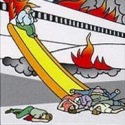|
Mr SoupTeeth posted:Still a bummer reading all the new model press releases harping on about incorporating lighter materials, how the new fancy frame is X pounds lighter than the outgoing and so on, with the final curb weight still coming in 300 lbs over the previous model. At least we're finally seeing more than 4-speeds in automatics and direct injection/variable valve voodoo trickling down to everything mitigating some of the bloat. The trend will probably continue until we stop seeing several hundred pounds of wiring and "convenience" features crammed into everything, wireless sensor links can't come soon enough. Dunno, this round of redesigns has had a number of extremely high-profile models with no change or losses in curb weights - Camry, F-150, etc. And wireless sensors are a terrible idea. Wiring is not what I'd call a significant driver of vehicle weights compared to things like increasing size, safety regulations, and increased NVH stuff, especially when the alternative is less reliable, more expensive, uses more power, and probably doesn't even weigh any less. That's a ton of sticker price that could go into lighter materials if you really wanted to reduce weight. Those more complicated transmissions and fancy turbo plumbing don't help, either - all of that takes up weight and space budget too, along with money that could be spent on making things lighter. OXBALLS DOT COM fucked around with this message at 19:45 on Feb 13, 2015 |
|
|
|

|
| # ? May 11, 2024 20:57 |
|
The next fusion could likely lose a bit of weight. Not the 800lbs from the lightweight concept, but i'm sure it will use a lot of it. http://www.motortrend.com/future/concept_vehicles/1406_ford_lightweight_concept_first_look/ Ford said they're working with a couple companies for cheap and plentiful carbon fiber.
|
|
|
|
Mange Mite posted:Dunno, this round of redesigns has had a number of extremely high-profile models with no change or losses in curb weights - Camry, F-150, etc. In modern luxury cars the weight of the wiring, sensors, and convenience bullshit isn't inconsequential, and with more mainstream cars rapidly adopting features from the high end I could see it becoming a bigger issue. There's a number of concepts for piezoelectric self powered and transmitting sensors that show some promise, but I sure as well wouldn't want to be an early adopter of such things. We might even see some crazy stuff using inductive charging or data transmission through the frame/body itself, all conjecture of course but still interesting concepts. You're spot on about turbo systems being a massive weight detriment for a plethora of reasons, transmissions and DI/VVT systems I'd argue not so much. Mazda's recent approach is a prime example of doing it right.
|
|
|
|
Pryor on Fire posted:This has always been my complaint with self driving cars, until the software can look at the car coming up behind you, tell that it is going way too fast, then make the decision to get the car out of the way by flooring it to hop the curb and get up on the sidewalk (assuming no pedestrians obviously) then it's not safer than me. I don't care about little fender benders or whatever the software is 10 million times better than humans at avoiding, I want it to be smart enough to get me the hell out of situations like that where poo poo can go really really bad. I 100% understand what you're saying, but for the majority of people, the robot car will be safer. For instance, it'd have been safer for the idiot drunk who almost hit you. Also, it'd be safer for the millions of Americans who don't check their rear-view mirrors at stoplights and are much more likely to be involved in other accidents the robot can avoid.
|
|
|
|
Rooster Brooster posted:I 100% understand what you're saying, but for the majority of people, the robot car will be safer. For instance, it'd have been safer for the idiot drunk who almost hit you. Also, it'd be safer for the millions of Americans who don't check their rear-view mirrors at stoplights and are much more likely to be involved in other accidents the robot can avoid. Exactly, computer cars would have not allowed that drunk to rear-end you in the first place.
|
|
|
|
I would imagine that would lead to insurance companies heavily penalizing non-autonomous cars. Want to turn your own steering wheel? that'll be $10,000 a year. shifting your own gears, that's another $2,000. Autonomous cars will cut heavily into insurance company revenues and profit. They're not going to take that lying down. Look how violent and irrational big record labels got when they started losing their relevance.
|
|
|
|
Powershift posted:I would imagine that would lead to insurance companies heavily penalizing non-autonomous cars. Wouldn't a drastic reduction in accidents and subsequent claims be beneficial to them?
|
|
|
|
Mr SoupTeeth posted:Wouldn't a drastic reduction in accidents and subsequent claims be beneficial to them? Yeah, but why would people keep paying them when the car is unlikely to ever crash? Companies will pop up overnight centered around autonomous cars. Staffed entirely by lawyers, extracting the bulk of their revenue through lawsuits against manufacturers and other drivers. Conventional insurance right now resembles a CD. You pay $20 for it, and it has a bunch of tracks you never listen to. It takes a big company to make that CD and get it on shelves everywhere. An autonomous car needs the 99 cent MP3 which is protection against uninsured drivers. Meeting government mandatory minimums for liability is basically a formality.
|
|
|
|
^^^^^^ Because there will still be laws requiring you to have insurance. Especially when the insurance companies have even more money to throw at politicians. Mr SoupTeeth posted:Wouldn't a drastic reduction in accidents and subsequent claims be beneficial to them? Pretty much. They aren't going to charge you a lot less because they flat out don't have to and the cars are going to be getting into less and less accidents. They'll be swimming in cash Scrooge McDuck style at that point.
|
|
|
|
Powershift posted:Yeah, but why would people keep paying them when the car is unlikely to ever crash? Because insurance will still likely be required by law. You'll also still likely to WANT to have stuff beyond just liability coverage. There's still a whole host of environmental things that can trash your $30k robot that you'll want to be covered for. Hail, trees, tornadoes, and flooding are all things that you would still need more than liability coverage to protect against. bull3964 fucked around with this message at 21:15 on Feb 13, 2015 |
|
|
|
Powershift posted:I would imagine that would lead to insurance companies heavily penalizing non-autonomous cars. Oh my god you're right. I still don't see how autonomous cars could possibly get past the multiple ethics considerations in this litigious day and age, ie a car driving you off of a cliff if it's the only way to avoid killing multiple children, etc...
|
|
|
|
bull3964 posted:Because insurance will still likely be required by law. And the portion required by law will basically be 100% profit, with tons of competition for that profit. The big companies will initally have a huge boom, but once people realize 90% of what they're paying for is unnecessary, they'll drop it. There's a whole bunch of things that don't need to be covered. animal collisions, because the car can see it and stop. at-fault collisions with other vehicles, single vehicle collisions which is currently about 1/3 of all collisions. Fewer collisions means lower demand for parts, which means lower demand by thieves. Profit won't be their primary motivation in trying to price human drivers out anyways. It will be getting the super safe machines in control.
|
|
|
|
Mr SoupTeeth posted:Wouldn't a drastic reduction in accidents and subsequent claims be beneficial to them? It will drive the costs down considerably unless they collude to keep premiums up. Small time insurance companies can swoop in with low rates since they payouts are going to be so much less. Also, my wife and I had a discussion about this the other day. She's an attorney, and I wanted to know her opinion on the changes we may see in liability once fully autonomous cars show up. What kind of "guarantee" on safety will these things have? If a software glitch causes an accident, is that on the manufacturer? If the software was not programmed with a specific obstacle in mind, and that causes an accident, who is at fault? There's a million scenarios I can think of where liability seems grey to me. My wife thinks everything will stay as it is, but I wonder if that's the case. When the human element is mostly removed, and an accident happens, how do you hold the human liable? Today, if a manufacturing defect causes an accident, who is at fault? eyebeem fucked around with this message at 21:32 on Feb 13, 2015 |
|
|
|
Mr SoupTeeth posted:In modern luxury cars the weight of the wiring, sensors, and convenience bullshit isn't inconsequential, and with more mainstream cars rapidly adopting features from the high end I could see it becoming a bigger issue. There's a number of concepts for piezoelectric self powered and transmitting sensors that show some promise, but I sure as well wouldn't want to be an early adopter of such things. We might even see some crazy stuff using inductive charging or data transmission through the frame/body itself, all conjecture of course but still interesting concepts. You still don't even see much in the way of unified data busses and processing in cars, let's not jump the gun here with wireless everything, especially given how much of a nightmare wireless anything is. I hear even simple wireless TPMS is already one of the most common malfunctions and it's not even a run-critical part. I know people say it's chassis, engine, then electronics in terms of subsystem weight but honestly given current trends a lot of that weight gain is likely due to bigger cars, more crash structure, and more NVH stuff, especially since manufacturers have realized that being quiet makes a big deal in terms of reviews and consumer perception.
|
|
|
|
eyebeem posted:It will drive the costs down considerably unless they collude to keep premiums up. Small time insurance companies can swoop in with low rates since they payouts are going to be so much less. They could probably fully automate airplanes right now, unlike cars which have to operate in an environment that's about a million times more complex. They still don't and a big part of that is that the pilot acts as a useful liability sink. Rooster Brooster posted:I 100% understand what you're saying, but for the majority of people, the robot car will be safer. For instance, it'd have been safer for the idiot drunk who almost hit you. Also, it'd be safer for the millions of Americans who don't check their rear-view mirrors at stoplights and are much more likely to be involved in other accidents the robot can avoid. Dunno, I've seen how the "majority of people" maintain their cars. I'm not that convinced it would be that much safer until way, way in the future. See also: https://www.youtube.com/watch?v=XBy78UJ081w OXBALLS DOT COM fucked around with this message at 21:41 on Feb 13, 2015 |
|
|
|
Powershift posted:animal collisions, because the car can see it and stop. I had a deer come flying out of bushes at the side of a suburban street and head first into the rear passenger door of my car about a decade ago. Killed itself good.
|
|
|
|
PCOS Bill posted:I had a deer come flying out of bushes at the side of a suburban street and head first into the rear passenger door of my car about a decade ago. Killed itself good. An autonomous car would have accelerated to jump out of the way of the deer. Then you'd get a speeding ticket.
|
|
|
|
Mange Mite posted:They could probably fully automate airplanes right now, unlike cars which have to operate in an environment that's about a million times more complex. They still don't and a big part of that is that the pilot acts as a useful liability sink. Exactly, I imagine liability would be on the driver to override the system in event of poor judgement/malfunction.
|
|
|
|
davebo posted:Seems like that's more of an SUV problem you'd see coming. SUV's should have to be built to withstand rollovers, but at the same time SUV's are hardly what's making this the golden age of cars anyway. She was stopped behind a line of cars on a highway and a driver in a five series somehow didn't see the gridlock (read: he was on his cell). He hit her going just about 55 mph, throwing her car rear end-up and then over an embankment. The first thing she heard when she regained consciousness was, "Holy poo poo, someone's alive in there!" I'm pretty sure that the mechanism would have caused a rollover in just about any passenger vehicle, and without rollover standards she'd be paralyzed or dead. Her injuries? A concussion and a sprained wrist. Modern crash standards save lives. I'm sure someone out there is saying, "HURRR THEN WE'LL JUST END UP DRIVING SLOW TANKS THEN," but the fact is that we don't. Cars are somewhat larger and heavier. They're also fast, comfortable, and fuel-efficient, and when inflation is taken into account they're not priced too badly either.
|
|
|
|
Mange Mite posted:You still don't even see much in the way of unified data busses and processing in cars, let's not jump the gun here with wireless everything, especially given how much of a nightmare wireless anything is. I hear even simple wireless TPMS is already one of the most common malfunctions and it's not even a run-critical part. I know people say it's chassis, engine, then electronics in terms of subsystem weight but honestly given current trends a lot of that weight gain is likely due to bigger cars, more crash structure, and more NVH stuff, especially since manufacturers have realized that being quiet makes a big deal in terms of reviews and consumer perception. Also chassis rigidity for fewer rattles and more consistent handling. Doing that without sticking a couple of cross braces through the passenger compartment isn't trivial and modern cars tend to have big passenger compartments.
|
|
|
|
eyebeem posted:It will drive the costs down considerably unless they collude to keep premiums up. Small time insurance companies can swoop in with low rates since they payouts are going to be so much less. Oh also re: the product liability thing, usually the manufacturer is liable for manufacturing and design defects even without negligence on their part, though it depends on the state. It also varies by jurisdiction whether you can also give partial liability to the owner, but often it doesn't work that way, and in most states it's pretty much strict liability for product defects. Basically if a manufacturing defect causes an accident, then the fault is with the manufacturer and they have to pay. If it's a software glitch, then it's almost always going to be on the manufacturer, most likely no matter how rare or unusual it is. Usually this is based on something like ordinary consumer expectations.
|
|
|
|
The whole heavy cars are slow thing, I feel like I don't see it panning out. We have more hp per lb now, and look at porksters like the GTR, Mustang, and Camaro. They put down drat good lap times despite their weight. I the last autocross I was at 2 of the top 6 cars by raw time were more than 3000lb and less than 340hp. A competent suspension, and good tires can do quite a bit. After all friction is directly proportional to the amount of force applied (perpendicular to the surface) and the force needed to create a given acceleration is directly proportional to the mass of the object. All gross simplifications, but I'm not sure I'm the biggest believer in add lightness any more. Clearly lighter is faster but holy gently caress are fat cars fast some times.
|
|
|
|
Of course, all that said about newer, heavier, safer cars, I still want to take a drive and buy this thing: http://bringatrailer.com/2015/02/11/turbo-awd-kei-1990-suzuki-alto-works/
|
|
|
|
Sadi posted:After all friction is directly propo
|
|
|
|
Sadi posted:The whole heavy cars are slow thing, I feel like I don't see it panning out. We have more hp per lb now, and look at porksters like the GTR, Mustang, and Camaro. They put down drat good lap times despite their weight. I the last autocross I was at 2 of the top 6 cars by raw time were more than 3000lb and less than 340hp. A competent suspension, and good tires can do quite a bit. After all friction is directly proportional to the amount of force applied (perpendicular to the surface) and the force needed to create a given acceleration is directly proportional to the mass of the object. All gross simplifications, but I'm not sure I'm the biggest believer in add lightness any more. Clearly lighter is faster but holy gently caress are fat cars fast some times. Tires don't really generate (much) force through friction.
|
|
|
|
Neptr posted:Tires don't really generate (much) force through friction. Well clearly, they deform to the surface and it gets properly complicated. That's what "All gross simplifications" was from. The basics certainly seem to roughly apply.
|
|
|
|
Sadi posted:Well clearly, they deform to the surface and it gets properly complicated. That's what "All gross simplifications" was from. The basics certainly seem to roughly apply. The problem with F = u * N is that it doesn't take into account the size of the contact patch, and the heavier cars of today are using some of the widest tires ever used on production cars, and tire tech today is incredible. Also tire load to grip isn't directly proportional, there's diminishing returns, so you need to keep mass low to get the most grip per unit mass.
|
|
|
|
Yes, the problem is that all these nannie state safety regulations are making cars needlessly heavy with needlessly strong rollover protection. Guess there's nothing left to do but remove all the wiring and switch to wireless transmission for in-car subsystems to save weight! 
|
|
|
|
Neptr posted:The problem with F = u * N is that it doesn't take into account the size of the contact patch, and the heavier cars of today are using some of the widest tires ever used on production cars, and tire tech today is incredible. Also tire load to grip isn't directly proportional, there's diminishing returns, so you need to keep mass low to get the most grip per unit mass. Isn't friction independent of surface area though?
|
|
|
|
Throatwarbler posted:wireless transmission for in-car subsystems You posted this with a picture of a red dick-extension that I think might be a Ram, and I actually had to make sure Chrysler weren't quite that stupid. redgubbinz fucked around with this message at 02:29 on Feb 14, 2015 |
|
|
|
SperginMcBadposter posted:Isn't friction independent of surface area though? In a perfect world, yes, but with imperfect road surfaces, tire deformation, and other factors unaccounted for in high school physics, a wider tire generally means more contact more of the time.
|
|
|
Throatwarbler posted:Yes, the problem is that all these nannie state safety regulations are making cars needlessly heavy with needlessly strong rollover protection. Guess there's nothing left to do but remove all the wiring and switch to wireless transmission for in-car subsystems to save weight! That truck is almost as awful as the opinions of dumb car nerds. And on the topic of awful truck things, the 2016 Tacoma still has god drat drum brakes on the rear. What the gently caress, Toyota?
|
|
|
|
|
Wheeee posted:That truck is almost as awful as the opinions of dumb car nerds. Is that so terrible? Rear discson't really contribute much over drums, and isn't having rear drums supposed to be better for keeping the E-brake from sticking?
|
|
|
|
They do when you're towing or hauling anything.
|
|
|
|
Wheeee posted:
Pretty common on smaller pickup trucks - the Colorado, Ranger, BT50, Amarok all use them still.
|
|
|
|
Throatwarbler posted:Yes, the problem is that all these nannie state safety regulations are making cars needlessly heavy with needlessly strong rollover protection. Guess there's nothing left to do but remove all the wiring and switch to wireless transmission for in-car subsystems to save weight! haha jesus CHRIST
|
|
|
|
Is the grill on the RAM supposed look like a snout with nostrils?
|
|
|
|
I'm genuinely surprised that truck nuts aren't a factory option for that monstrosity.
|
|
|
|
Mr. Apollo posted:Is the grill on the RAM supposed look like a snout with nostrils? kind of appropriate that it looks like a pig's nose, IMO.
|
|
|
|

|
| # ? May 11, 2024 20:57 |
|
That hideous new Ram is going to put places like AutoZone out of business, coming with all that garish trim from the factory.
|
|
|

































